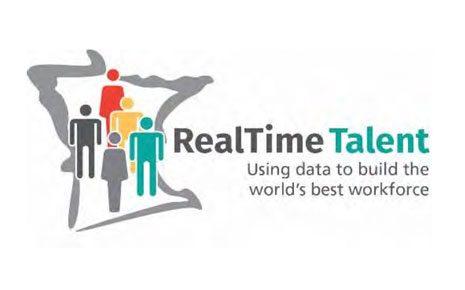Ramsey County Workforce Solutions: Information Technology Challenges and Opportunities

The Threats and Opportunities in Ramsey County’s Information Technology Talent Pipeline
Written by RealTime Talent
Introduction
The COVID-19 pandemic has highlighted technology’s critical role in business innovation in response to rapid market shifts. It has also surfaced greater disparities in educational attainment, career advancement, and technology access for students of computer fields. The Information Technology sector faces unique talent challenges in the face of COVID-19, including the potential for rapidly increasing demand for talent outpacing local supply in the MSP Metro and uneven access to technology, training, and computer science education. Over the next five years, Information Technology careers are forecast to grow by at least 0.5% annually on average in Ramsey County, well beyond what the existing talent pool can easily supply.
Information Technology roles remain an area of robust local career opportunities with forecasted increasing demand and relatively low unemployment despite the pandemic's impacts. As of the third quarter of 2020, an estimated 12,689 people work in Ramsey County in Information Technology roles such as Software Developers, Database Administrators, and Information Security Analysts, representing about 4% of all local employment. From March 16, 2020, to February 23, 2021, just 1,691 workers in computer occupations applied for unemployment insurance in Ramsey County, representing 1.6% of the County's unemployment insurance applications.[1] Across all Information Technology occupations, unemployment was estimated at 2.4% as of the third quarter of 2020. The local average annual wage in Information Technology careers is about $97,600.
Analysis
Significant Misalignments Threaten Future Sector Growth
The Gap Between Talent and Job Requirements
The severe shortage of qualified tech talent touches nearly every industry in Ramsey County. In general, current talent employed in Information Technology has higher educational attainment than required for local Information Technology jobs. In the Information Support and Services career pathway, about 39% of jobs posted in 2020 required a Bachelor’s degree or higher; however, nearly 63% of people currently working in this pathway hold a Bachelor’s degree or higher. Increased educational attainment requirements or credential inflation can create barriers for jobseekers with certificates, bootcamp experience, or 2-year degrees and employers struggling to fill jobs.[2]
K-12 Education Misalignment: Computer Science is Missing from Many Minnesota Schools
Computer Science education is a critical early talent pipeline intervention necessary for building a strong tech talent pool. Although the MSP Metro has strong Information Technology bootcamps and experiential opportunities aimed at youth and young adults, Minnesota is one of the few states that does not have a state plan, rigorous standards, or set-aside funding for Information Technology and Computer Science education. Schools in urban areas are less likely to offer Computer Science courses (15%) than rural Minnesota schools (22%). Disparities in access to Computer Science courses are bleak and contribute significantly to future postsecondary award gaps and employment disparities. One way to identify schools that offer Computer Science coursework is through Advanced Placement (AP) computer science courses at the high school level. Out of the 187 Advanced Placement (AP) courses are offered at high schools within Ramsey County in the 2020-21 school year, 14 or 7% were Information Technology courses.
Postsecondary Underproducing Tech Talent
Postsecondary institutions are underproducing Information Technology talent metro-wide compared to national benchmarks, making it challenging for Ramsey County employers to find highly qualified local Information Technology talent. In the Academic Year 2018-2019, institutions in Ramsey County conferred 765 Information Technology awards—about 27% of all IT awards in the MSP Metro. Among 2019 MSP Metro Information Technology postsecondary graduates, 72.6% completed a Bachelor’s degree or higher in Information Technology. Compared to the current education requirements for tech jobs (82% of postings requiring a Bachelor’s degree or higher), the percent completion suggests an overall 9.4-percentage point credential gap.
Lack of Diversity: Employment and Award Gaps
Women are underrepresented in Ramsey County’s Information Technology careers, illustrated by a large employment gap. Women make-up 49.8% of workers in all occupations across Ramsey County but only hold 24.3% of local Information Technology roles. In 2019, among females who completed a postsecondary degree or certificate in Information Technology in the MSP Metro, about 75.8% completed a Bachelor’s degree or higher, compared to 71.6% of males in the same field. Although women are earning advanced Information Technology degrees at a similar rate to men, they remain less represented in the overall population of individuals completing Information Technology degrees.
There are also disparate gaps in employment by racial and ethnic subgroups in Information Technology roles. For instance, Black and African American talent is underrepresented by 12.9-percentage points in tech employment compared to the share of Black and African American workers in all Ramsey County occupations. Among Black and African American Information Technology degree or certificate completers, 71.7% completed a Bachelor’s degree or higher, compared to 82% of tech job postings with the same educational requirement, representing a 10.3-percentage point credential gap. By contrast, Asian talent is overrepresented by 12.9-percentage points in current tech employment compared to the share of Asian workers in all Ramsey County occupations, however, are experiencing a 16.7-percentage point credential gap compared to local demand represented by job postings. Employment and award gaps by gender, race, and ethnicity point to a severely tight talent market for employers seeking tech talent and highlight the imperative of driving cross-sector strategies that target diversification of Information Technology occupations.
Opportunities
Centering Equity Across the Entire Talent Ecosystem
Information Technology careers are good jobs. They are high-wage, high-demand, and high-skill, and current forecasts suggest that the existing talent supply and talent pipelines will not be enough to meet local employer demand in the future. Growth of the Information Technology talent pipeline must be done with an eye to equitable recovery. Critical considerations for successful growth and diversification of the future talent pool will address (but are not limited to):
- Access and affordability of quality internet connection and computers at home,
- Alignment between K-12 schools, workforce development programming, and employer needs to train potential talent with greater precision and decrease the barriers to entry to high shortage tech positions,
- Collective employer commitments to identify positions where the substance of the work does not require a Bachelor’s degree and reevaluate posted position requirements,
- Postsecondary institutions increasing student attraction to and persistence through Information Technology Bachelor’s degree programming, including addressing cost barriers,
- Employer investments in the training and career advancement of diverse talent.
An investment in Information Technology education and training programs is an investment in individuals, families, communities, businesses, the economy, and the future.
[1] Unemployment Insurance Application counts are collected by the Minnesota Department of Employment and Economic Development and aggregated at the minor group level or three-digit level.
[1] https://www.burning-glass.com/research-project/credentials-gap/
Posted: April 10, 2021
Category:







